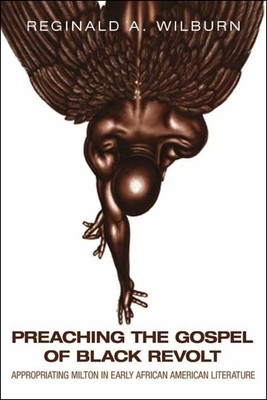
- We will send in 10–14 business days.
- Author: Reginald A Wilburn
- Publisher: Penn State University Press
- ISBN-10: 0271087293
- ISBN-13: 9780271087290
- Format: 15.2 x 22.9 x 2.3 cm, minkšti viršeliai
- Language: English
- SAVE -10% with code: EXTRA
Reviews
Description
In this comparative and hybrid study, Reginald A. Wilburn offers the first scholarly work to theorize African American authors' rebellious appropriations of Milton and his canon. Wilburn engages African Americans' transatlantic negotiations with perhaps the preeminent freedom writer in the English tradition.
Preaching the Gospel of Black Revolt contends that early African American authors appropriated and remastered Milton by completing and complicating England's epic poet of liberty with the intertextual originality of repetitive difference. Wilburn focuses on a diverse array of early African American authors, such as Phillis Wheatley, Frances Ellen Watkins Harper, Frederick Douglass, and Anna Julia Cooper. He examines the presence of Milton in their works as a reflection of early African Americans' rhetorical affiliations with the poet's satanic epic for messianic purposes of freedom and racial uplift.
Wilburn explains that early African American authors were attracted to Milton because of his preeminent status in literary tradition, strong Christian convictions, and poetic mastery of the English language. This tripartite ministry makes Milton an especially indispensible intertext for authors whose writings and oratory were sometimes presumed beneath the dignity of criticism. Through close readings of canonical and obscure texts, Wilburn explores how various authors rebelled against such assessments of black intellect by altering Milton's meanings, themes, and figures beyond orthodox interpretations and imbuing them with hermeneutic shades of interpretive and cultural difference. However they remastered Milton, these artists respected his oeuvre as a sacred yet secular talking book of revolt, freedom, and cultural liberation.
Preaching the Gospel of Black Revolt particularly draws upon recent satanic criticism in Milton studies, placing it in dialogue with methodologies germane to African American literary studies. By exposing the subversive workings of an intertextual Middle Passage in black literacy, Wilburn invites scholars from diverse areas of specialization to traverse within and beyond the cultural veils of racial interpretation and along the color line in literary studies.
EXTRA 10 % discount with code: EXTRA
The promotion ends in 22d.01:50:24
The discount code is valid when purchasing from 10 €. Discounts do not stack.
- Author: Reginald A Wilburn
- Publisher: Penn State University Press
- ISBN-10: 0271087293
- ISBN-13: 9780271087290
- Format: 15.2 x 22.9 x 2.3 cm, minkšti viršeliai
- Language: English English
In this comparative and hybrid study, Reginald A. Wilburn offers the first scholarly work to theorize African American authors' rebellious appropriations of Milton and his canon. Wilburn engages African Americans' transatlantic negotiations with perhaps the preeminent freedom writer in the English tradition.
Preaching the Gospel of Black Revolt contends that early African American authors appropriated and remastered Milton by completing and complicating England's epic poet of liberty with the intertextual originality of repetitive difference. Wilburn focuses on a diverse array of early African American authors, such as Phillis Wheatley, Frances Ellen Watkins Harper, Frederick Douglass, and Anna Julia Cooper. He examines the presence of Milton in their works as a reflection of early African Americans' rhetorical affiliations with the poet's satanic epic for messianic purposes of freedom and racial uplift.
Wilburn explains that early African American authors were attracted to Milton because of his preeminent status in literary tradition, strong Christian convictions, and poetic mastery of the English language. This tripartite ministry makes Milton an especially indispensible intertext for authors whose writings and oratory were sometimes presumed beneath the dignity of criticism. Through close readings of canonical and obscure texts, Wilburn explores how various authors rebelled against such assessments of black intellect by altering Milton's meanings, themes, and figures beyond orthodox interpretations and imbuing them with hermeneutic shades of interpretive and cultural difference. However they remastered Milton, these artists respected his oeuvre as a sacred yet secular talking book of revolt, freedom, and cultural liberation.
Preaching the Gospel of Black Revolt particularly draws upon recent satanic criticism in Milton studies, placing it in dialogue with methodologies germane to African American literary studies. By exposing the subversive workings of an intertextual Middle Passage in black literacy, Wilburn invites scholars from diverse areas of specialization to traverse within and beyond the cultural veils of racial interpretation and along the color line in literary studies.


Reviews